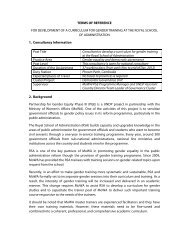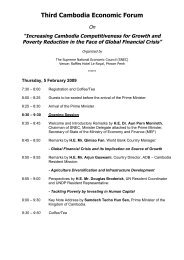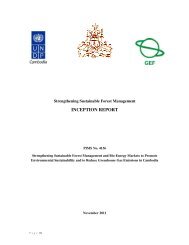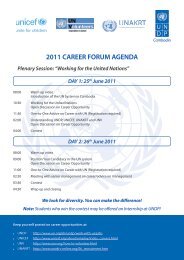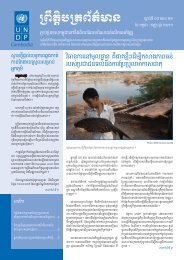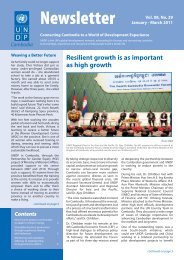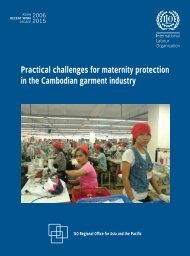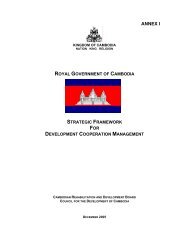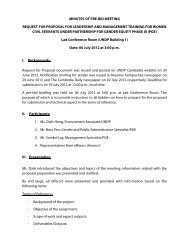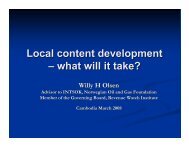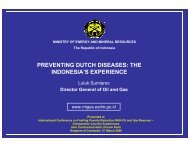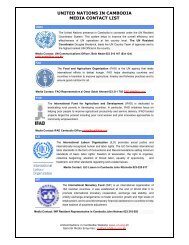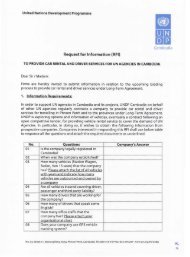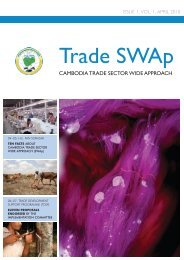UN Analysis Final.pdf - United Nations in Cambodia
UN Analysis Final.pdf - United Nations in Cambodia
UN Analysis Final.pdf - United Nations in Cambodia
You also want an ePaper? Increase the reach of your titles
YUMPU automatically turns print PDFs into web optimized ePapers that Google loves.
IX CONCLUSIONS &<br />
RECOMMENDATIONS<br />
Any set of recommendations from this Situational <strong>Analysis</strong> of <strong>Cambodia</strong>n Youth needs to be grounded<br />
<strong>in</strong> the tremendous strides that have occurred <strong>in</strong> the country over the past 15 years. For example,<br />
illiteracy has decreased as participation <strong>in</strong> primary and secondary education has <strong>in</strong>creased. While<br />
<strong>Cambodia</strong> has a long way to go to make education equally accessible <strong>in</strong> rural areas and equally available to<br />
girls as for boys, it has already made great advances towards achiev<strong>in</strong>g that goal. Moreover, while there is<br />
need to strengthen health <strong>in</strong>formation and service delivery <strong>in</strong>frastructures, this analysis notes the substantial<br />
strides made <strong>in</strong> reduc<strong>in</strong>g HIV prevalence <strong>in</strong> the country.<br />
The extent of the <strong>in</strong>terrelation between the problems faced by <strong>Cambodia</strong>n youth is strik<strong>in</strong>g. For example,<br />
rural poverty dim<strong>in</strong>ishes the likelihood of obta<strong>in</strong><strong>in</strong>g an education. Uneducated people are more likely to<br />
have large families. Moreover, rural poor who migrate to the cities for work are more likely than others to be<br />
homeless and unemployed, and thus more likely to turn to crim<strong>in</strong>al behaviour or to seek employment as<br />
unskilled labourers <strong>in</strong> Thailand and Malaysia. Those who rema<strong>in</strong> <strong>in</strong> rural communities are more likely to live on<br />
subsistence farm<strong>in</strong>g, perpetuat<strong>in</strong>g the cycle of poverty and stress that lead to sexual and physical abuse.<br />
The follow<strong>in</strong>g recommendations are based on the present Situational <strong>Analysis</strong> and enhanced at a workshop<br />
held <strong>in</strong> February 2009. These suggestions are presented with the awareness that young people are the hope<br />
for the nation. And with the awareness that without aggressive and coord<strong>in</strong>ated set of <strong>in</strong>terventions with<br />
government, bilateral organizations and NGOs, the demographic dividend that could flow from the rapidly<br />
grow<strong>in</strong>g number of youth enter<strong>in</strong>g both reproductive age and the work force, may well become a national<br />
nightmare.<br />
RECOMMENDATIONS<br />
The recommendations one – six are crosscutt<strong>in</strong>g. Specific recommendations under the themes of education,<br />
health, employment, vulnerability/social protection and , , rights and participation are found <strong>in</strong> the matrix<br />
below:<br />
1. Provide technical and f<strong>in</strong>ancial support to accelerate a f<strong>in</strong>al draft<br />
of The <strong>Cambodia</strong>n National Youth Policy<br />
Ensure <strong>in</strong>clusion of youth <strong>in</strong> decision mak<strong>in</strong>g and development plann<strong>in</strong>g with<strong>in</strong> the policy.<br />
ToR prepared for consultant and timel<strong>in</strong>es developed by end of March 2009<br />
Led by <strong>UN</strong>RCO with <strong>UN</strong>ICEF, <strong>UN</strong>FPA, <strong>UN</strong>V and <strong>UN</strong>ESCO.<br />
2. Strengthen Strategic Information about young <strong>Cambodia</strong>ns to <strong>in</strong>form policy<br />
and programm<strong>in</strong>g <strong>in</strong> 2010 and beyond.<br />
Build<strong>in</strong>g on MoEYS support, implement a national basel<strong>in</strong>e survey of ma<strong>in</strong>stream <strong>Cambodia</strong>n youth<br />
that <strong>in</strong>cludes the topics of sexual and reproductive health, education, disability, work, family life, media<br />
and IT <strong>in</strong>fluence, mental wellbe<strong>in</strong>g, drug and alcohol abuse and selected health risk behaviour.<br />
Situation <strong>Analysis</strong> of Youth <strong>in</strong> <strong>Cambodia</strong><br />
97



